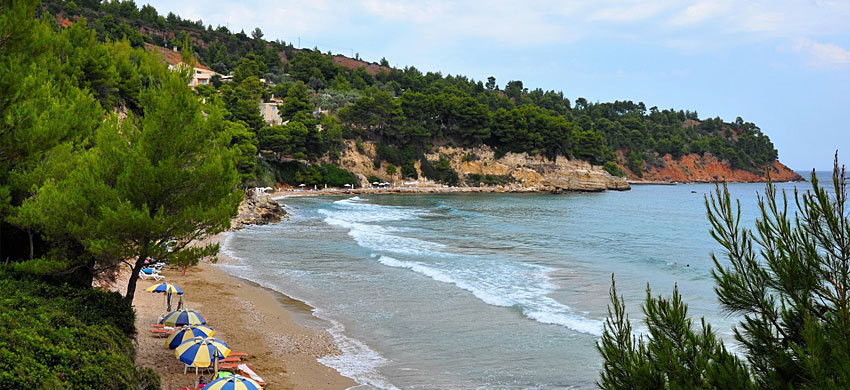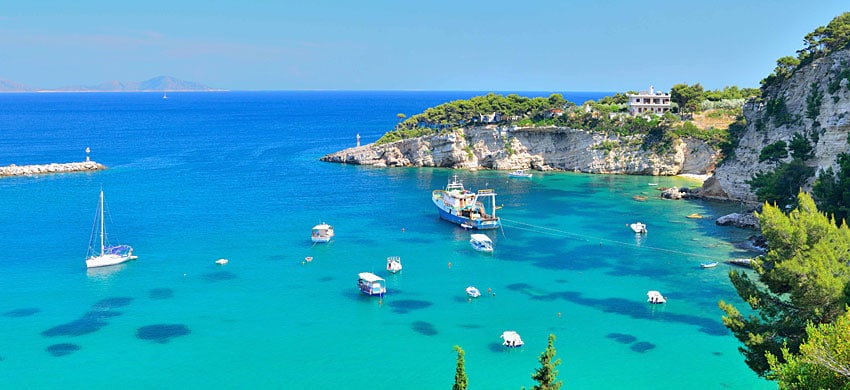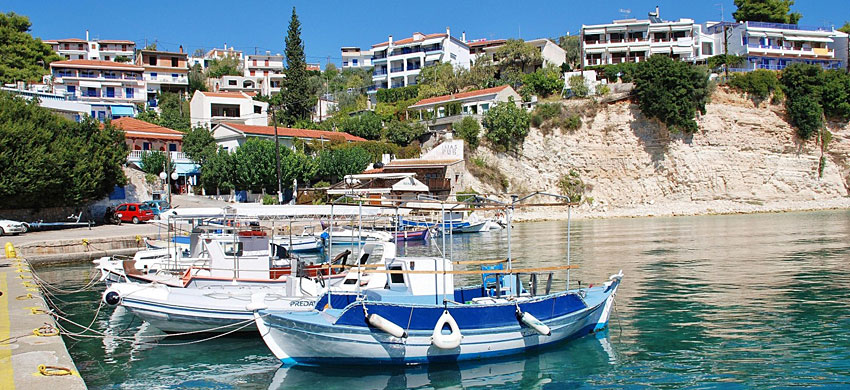

Ancient Ikos, now the island of Alonissos, is not a destination for everyone, which is why the few tourists who come here find it extremely fascinating.
It is a remote island in the Sporades archipelago, the farthest from the mainland, which means longer and more expensive trips, but this uncomfortable position has protected it from the invasion of mass tourism.
No hustle and bustle, here you can expect unspoiled landscapes, villages where life flows slowly and the cleanest waters of the Aegean, where thanks to the creation of a marine park you can still see dolphins and monk seals swimming.
This paradise is therefore the ideal destination for those who want a vacation where the sea is the protagonist, for those who want to leave at home the problems of everyday life and for those who love simple things like a dinner in a tavern, a walk along the sea or a romantic sunset.

If you love the sea more than the mundane, Alonissos is the perfect destination for you. The beaches of the island are not festive, in compensation, however, are bathed by a very clear sea, thanks to the establishment of the marine park that has preserved the quality and cleanliness of the water.
Rocky and pebble beaches prevail and almost all are very quiet, ideal for those who want to experience the sea fully, feeling immersed in nature.
You could really go at random, so much so that the sea here is really beautiful, but if you prefer to go for sure here is a list of beaches of Alonissos not to be missed:

The main resort of Alonissos is Patitiri, a port town in the south of the island. Rebuilt after the 1965 earthquake, it cannot boast the charm of other more characteristic villages of the Greek islands, but it still manages to make itself loved by tourists for its relaxed atmosphere, the numerous boat excursions that depart from the pier and for the delicious pastry shops.
There are only two roads in Patitiri, both starting from the pier, going up to the main square and then splitting: on one side you go to Steni Vala, on the other you go to Old Alonissos.
If after the boat trip to the marine park you want to learn more about the delicate ecosystem of the island of Alonissos, visit the well-kept Information Center of MOM, an environmental organization engaged in study, research and conservation of the monk seal species, the only seal in the Mediterranean and one of the species most at risk of extinction.
The center is located on the waterfront of Patitiri and is a mine of information about the seal and the marine environment, you can also buy souvenirs whose proceeds will support the research projects of the MOM.
It is instead dedicated to the traditions of the island another interesting museum of Patitiri, the Folklore Museum of the Northern Sporades: on display you will find ancient nautical maps, craftsman’s tools and a curious collection of pirate weapons.
Complete your visit to the museum with a stop in the delightful cafeteria upstairs, with a pleasant view of the harbor and walls decorated with works by local artists.
For accommodation you can choose from a dozen hotels, from 1 to 3 stars, and as many room rentals; much more choice for those who prefer to stay in an apartment, studio or vacation home.

Only 3 km away from the port, Old Alonissos, which you will also hear called Chora or Palia Alonnisos, is decidedly more picturesque, with traditional white houses, steep streets that climb up the hill, ancient Byzantine churches spared by the earthquake and splendid panoramic views.
Walking along an ancient mule track you can reach the nearest beach: it is a relaxing walk of one kilometer, between nature and traditions; if you love walking you will find other suggestive paths in the area.
Old Alonissos has not sold itself to mass tourism and its authentic atmosphere is what visitors love about this resort, but this translates into a reduced offer of accommodation: only a couple of hotels of medium-high category and a dozen apartments and vacation homes.

An exclusive location for your vacation in Alonissos is Votsi, a village located in the northern part of the island, the least populated. It can be reached through a road immersed in the green, between valleys and paths.
Little touristy, the village of Votsi is more an area of small villas and exclusive 4-5 star hotels.
One does not come to Alonissos for famous museums or discos: the great attraction of the island is its lush nature, which has remained largely unspoiled thanks to the establishment of the National Marine Park of Alonissos and the Northern Sporades.
Founded in 1992 in order to protect the monk seal and some species of endangered seabirds, it is the largest marine park in Europe: in addition to Alonissos, it includes six other small islands and twenty uninhabited islets.
During the summer, it is possible to visit the park with a boat excursion, but only boats authorized by the park can make the tours. Finding an authorized boat won’t be difficult for you because tour tickets are on sale at many tourist agencies on the island.
The boat trip to the park of Alonissos is a rare opportunity to see a pristine marine environment in full respect of nature. The sighting of monk seals is not guaranteed, in fact it is quite difficult: you can console yourself by seeing the dolphins swimming!
The hotel facilities of Alonissos are concentrated along the east coast of the island, where most of the beaches are located, and in the southern part.
Alonissos is a remote island and reaching it requires more effort than other tourist destinations. There is no airport on the island, so it must be taken into account to have to land somewhere else and then take a ferry.
The closest island is Skiathos, but it is preferable to land in Thessaloniki because there are more direct flights with Europe. Put into consideration that you may have to spend a night or more in Skiathos or Thessaloniki in order to take the ferry to Alonissos.
Alonissos is an island famous for not having had an easy life. Two terrible events hit the island in the last century, with serious consequences for the population and for the economy.
In 1952 the production of wine, one of the most important activities for the economy of the island, was devastated by aninfestation of phylloxera, endangering the whole agricultural sector.
Only thirteen years later an earthquake destroyed the ancient capital of the island, forcing the inhabitants to move and to take refuge in anti-seismic houses.
Fortunately, the past is now distant: in the present of Alonissos shine the sun and serenity.